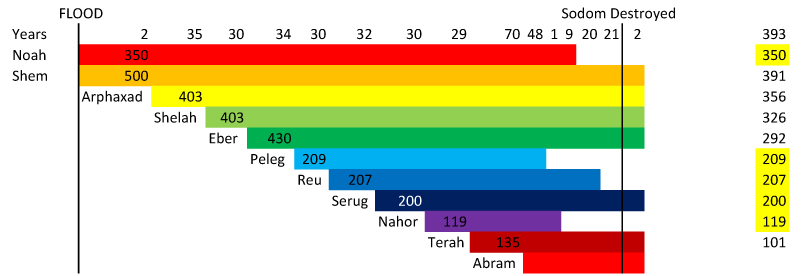The third assumption I found in Richard Wayne Garganta’s attempt to eliminate “hell talk” from the Bible was: 3) Punishment is not merely consequential but effectual in purging or purifying sin. I’ve selected a quote from “Bible Threatenings Explained”[1] that led me to consider this assumption as a major precursor of his views on hell:
What God is determined to destroy in the sinner is that which makes him a sinner. Christ said He came to utterly destroy evil – the works of the devil. He said he came to save the world, not to destroy men. God proceeds towards the wayward as a good parent must, to eradicate the evil by punishment.
While I must agree that God has proceeded “to eradicate the evil by punishment,” I am not convinced that He believes, or the Bible teaches, that punishment is the method that will “destroy in the sinner…that which makes him a sinner” or “utterly destroy evil.”
Before the flood the Lord saw that the wickedness of humankind had become great on the earth. Every inclination of the thoughts of their minds was only evil all the time. The Lord regretted that he had made humankind on the earth, and he was highly offended. So the Lord said, “I will wipe humankind, whom I have created, from the face of the earth – everything from humankind to animals, including creatures that move on the ground and birds of the air, for I regret that I have made them.”[2] The earth was ruined in the sight of God; the earth was filled with violence. God saw the earth, and indeed it was ruined, for all living creatures on the earth were sinful.[3]
Death by drowning is a kind of ultimate punishment. I suppose it was effective for a time at purging wickedness, evil, violence and sinfulness from the earth, until Noah cursed Canaan for Ham’s witness(?)—Ham, the father of Canaan, saw his father’s nakedness[4]—gossip(?)—Ham told his two brothers who were outside[5]—mockery, maybe? Let’s be frank, wasn’t it Ham’s revelation of the frayed dirty edges of Noah’s righteousness that angered Noah? Hadn’t Noah exposed himself, literally in a drunken stupor and figuratively when he cursed Ham’s son? I should probably say figuratively in a drunken stupor and literally when he cursed Canaan, to keep the metaphor and reality straight.
My difficulty with Mr. Garganta’s third assumption is more personal and idiosyncratic to the path of righteousness I’m on than the others. As the Holy Spirit convinced me that the Bible as a book of rules would never satisfy my God-given hunger and thirst for righteousness I needed a new understanding of Paul’s assurance: Every scripture is inspired by God and useful for teaching, for reproof, for correction, and for training in righteousness, that the person dedicated to God may be capable and equipped for every good work.[6] One fruitful way of viewing the Bible is as a narrative of the tidal movement from human responsibility to God’s grace.
| The highwater mark of human responsibility | The highwater mark of God’s grace |
| Is it not true, God asked the murderer Cain, that if you do what is right, you will be fine? But if you do not do what is right, sin is crouching at the door. It desires to dominate you, but you must subdue it.
Genesis 4:7 (NET) |
I have been crucified with Christ, wrote the murderer Saul transformed as Paul the Apostle, and it is no longer I who live, but Christ lives in me. So the life I now live in the body, I live because of the faithfulness of the Son of God, who loved me and gave himself for me.
Galatians 2:20 (NET) |
| Cain killed his brother in a jealous rage. If it weren’t so tragic, the image of God telling this murderer to subdue the sin that desires to dominate him is laughable. | Saul tried to cover his motives with law and religion, but Paul eventually recognized it as the very same jealous rage.[7] |
I don’t get the impression that Cain expected God to bless that jealous rage as righteousness. Saul did, superficially at least. Something in Jesus’ words must have rung true somewhere deep within Saul, since we have the writings of Paul the Apostle, and not Saul the blind Inquisitor who withstood the “temptation” of the “demon” disguised as an angel of light on the road to Damascus. Saul the blind Inquisitor was crucified with Christ there, or later in the desert.[8] Paul himself related this death to baptism: Or do you not know that as many as were baptized into Christ Jesus were baptized into his death? Therefore we have been buried with him through baptism into death, in order that just as Christ was raised from the dead through the glory of the Father, so we too may live a new life.[9]
I will suggest that the most distance covered from human responsibility to the grace of God in the shortest amount of time is most evident in the two covenants[10] separated by forty days[11] and the incident with the golden calf.[12] But I don’t think I would ever have recognized that movement apart from Paul’s writings and the Holy Spirit’s leading and guidance. Here I want to consider that movement as revealed in the writings of the prophet Hosea and relate it to the assumption that punishment is/was effective at purging or purifying sin rather than merely a consequence of that sin.
[The people of the northern kingdom of Israel] consult their wooden idols, the Lord spoke through Hosea, and their diviner’s staff answers with an oracle. The wind of prostitution (zânûn) blows them astray; they commit spiritual (tachath) adultery (zânâh) against their God [Table]. They sacrifice (zâbach) on the mountaintops, and burn offerings on the hills; they sacrifice under (tachath) oak, poplar, and terebinth, because their shade is so pleasant. As a result, your daughters have become cult prostitutes (zânâh), and your daughters-in-law commit adultery (nâʼaph) [Table]. I will not punish (pâqad) your daughters when they commit prostitution (zânâh), nor your daughters-in-law when they commit adultery (nâʼaph). For the men consort with harlots (zânâh), they sacrifice (zâbach) with temple prostitutes (qedêshâh).[13]
Ephraim [another name for the northern kingdom of Israel] has attached himself to idols, the Lord continued. Do not go near him [Table]! They consume their alcohol, then engage in cult prostitution (zânâh); they dearly love their shameful (qâlôn) behavior [Table].[14] I assume that this was πορνεία (that zâbach was used facetiously, they offered sexual intercourse to God under shade trees with qedêshâh). And I assume that this was essentially what was going on in the church at Pergamum: But I have a few things against you, Jesus said: You have some people there who follow the teaching of Balaam, who instructed Balak to put a stumbling block before the people of Israel so they would eat food sacrificed to idols and commit sexual immorality (πορνεῦσαι, a form of πορνεύω).[15] It is clearly what was going on with the Moabite women after Balaam prophesied for, rather than against, Israel (Numbers 25:1-3 NET):
When Israel lived in Shittim, the people began to commit sexual immorality (zânâh) with the daughters of Moab. These women invited the people to the sacrifices of their gods; then the people ate and bowed down to their gods. When Israel joined themselves to Baal-peor, the anger of the Lord flared up against Israel.
The “Children of God” called it flirty fishing.[16]
I also assume this kind of πορνεία was practiced in the church at Thyatira: You tolerate that woman Jezebel, Jesus said, who calls herself a prophetess, and by her teaching deceives my servants to commit sexual immorality (πορνεῦσαι, a form of πορνεύω) and to eat food sacrificed to idols. I have given her time to repent, but she is not willing to repent of her sexual immorality (πορνείας, a form of πορνεία). Look! I am throwing her onto a bed of violent illness, and those who commit adultery (μοιχεύοντας, a form of μοιχεύω) with her into terrible suffering, unless they repent of her deeds. Furthermore, I will strike her followers with a deadly disease, and then all the churches will know that I am the one who searches minds and hearts. I will repay each one of you what your deeds deserve.[17]
This is essentially the same punishment He brought upon Israel when they joined themselves to Baal-peor—Those that died in the plague were 24,000[18]—unless plague here is a euphemism for the men arrested and hanged[19] (not to mention skewered[20]). But to the northern kingdom of Israel, He said, I will be like a lion to Ephraim, like a young lion to the house of Judah. I myself will tear them to pieces, then I will carry them off, and no one will be able to rescue them! Then I will return again to my lair until they have suffered their punishment (ʼâsham).[21] Then they will seek me; in their distress they will earnestly seek me.[22]
He continued to prophesy what Israel would say after they were punished (Hosea 6:1-3 NET):
Come on! Let’s return to the Lord! He himself has torn us to pieces, but he will heal us! He has injured us, but he will bandage our wounds! He will restore us in a very short time; he will heal us in a little while, so that we may live in his presence. So let us acknowledge him! Let us seek to acknowledge the Lord! He will come to our rescue as certainly as the appearance of the dawn, as certainly as the winter rain comes, as certainly as the spring rain that waters the land.
If I stopped here punishment would appear to be overwhelmingly effective at purging or purifying evil. The Lord didn’t stop here so neither will I (Hosea 6:4 NET):
What am I going to do with you, O Ephraim? What am I going to do with you, O Judah? For your faithfulness is as fleeting as the morning mist; it disappears as quickly as dawn’s dew!
There is a refrain in Deuteronomy: In this way you must purge (bâʽar) out evil from within.[23] In this way you will purge (bâʽar) evil from among you.[24] …in this way you will purge (bâʽar) evil from Israel.[25] …in this way you will purge (bâʽar) evil from among you.[26] All refer to capital punishment, stoning primarily. If that is all that Mr. Garganta meant by his assertion that “God proceeds…to eradicate the evil by punishment,” I concede the point. But it seems clear that the survivors of punishment of lesser consequence than death, or those who merely fear punishment, are encouraged to hypocrisy by such punishment and fear. They become actors, not poets or doers of the law. They are devoid of the love that fulfills the law. The Lord’s judgment was swift and severe (Hosea 6:5 NET):
Therefore, I will certainly cut you into pieces at the hands of the prophets; I will certainly kill you in fulfillment of my oracles of judgment; for my judgment will come forth like the light of the dawn.
The time of judgment is about to arrive, the Lord promised through Hosea. The time of retribution is imminent! Let Israel know! The prophet is considered a fool – the inspired man is viewed as a madman – because of the multitude of your sins and your intense animosity.[27] And it happened to them as He promised. But there is still hope for them (Hosea 11:8, 9 NET):
How can I give you up, O Ephraim? How can I surrender you, O Israel? How can I treat you like Admah? How can I make you like Zeboiim? I have had a change of heart! All my tender compassions are aroused [Table]! I cannot carry out my fierce anger! I cannot totally destroy Ephraim! Because I am God, and not man – the Holy One among you – I will not come in wrath!
This sounds like grace, God’s unilateral decision, not something effected in any way by the punishment of death the inhabitants of the northern kingdom of Israel suffered. It seems to me then that the failure of punishment to purge wickedness, evil, violence and sinfulness in the living is part of the justification for God’s unilateral grace: Let God be proven true, and every human being shown up as a liar, just as it is written: “so that you will be justified in your words and will prevail when you are judged.”[28]
As I worked on this essay my daughter suffered a stroke. That is definitely things not going my way. When I had the chance to consider if God was punishing her, me, or us for something, praying that her sins have more to do with me and mine than hers, making no real sense, just a jumble of thoughts…take it out on me not her…the Holy Spirit brought Scripture to my mind: “Rabbi, who sinned, this man or his parents, that he was born blind?” Jesus answered, “Neither this man nor his parents sinned, but that the works of God should be revealed in him.”[29]
I don’t take Him to mean that this man and his parents lived lives of sinless perfection. I don’t even take Him to mean necessarily that the parents’ sins in this case had no causal relationship to their son’s blindness. I take Him to mean that He wanted his disciples to concern themselves with the revelation of the works of God rather than establishing blame.
[1] Richard Wayne Garganta, “Bible Threats Explained”
[6] 2 Timothy 3:16, 17 (NET) Table1
[7] Acts 9:1; 26:9-11; Romans 10:19; 11:11, 14; 1 Timothy 1:13 In the past I was a blasphemer, a persecutor, and a violent man (ISVNT). The NET translators chose arrogant for ὑβριστήν, but acknowledged in a note that they might have chosen violent or cruel.
[10] The Two Covenants: The second “covenant,” however, is much more like a unilateral declaration, a promise, than a contract between two parties. Why then was the law given? It was added because of transgressions, until the arrival of the descendant [Jesus the Son of God] to whom the promise had been made. It was administered through angels by an intermediary. Now an intermediary is not for one party alone, but God is one [Father and Son]. Is the law therefore opposed to the promises of God? Absolutely not! For if a law had been given that was able to give life, then righteousness would certainly have come by the law. But the scripture imprisoned everything and everyone under sin so that the promise could be given – because of the faithfulness of Jesus Christ – to those who believe. Galatians 3:19-22 (NET)
[11] Exodus 24:18 (NET)
[12] Exodus 32 (NET)
[16] xFamily.org, “Flirty Fishing”
[20] Numbers 25:6-8 (NET)
[21] NET note: “The verb יֶאְשְׁמוּ (ye’shemu, Qal imperfect 3rd person masculine plural from אָשַׁם, ’asham, ‘to be guilty’) means ‘to bear their punishment’ (Ps 34:22-23; Prov 30:10; Isa 24:6; Jer 2:3; Hos 5:15; 10:2; 14:1; Zech 11:5; Ezek 6:6; BDB 79 s.v. אָשַׁם 3). Many English versions translate this as ‘admit their guilt’ (NIV, NLT) or ‘acknowledge their guilt’ (NASB, NRSV), but cf. NAB ‘pay for their guilt’ and TEV ‘have suffered enough for their sins.’”



